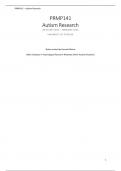Class notes
Lecture notes Autism Research (PRMP141)
- Course
- Institution
MSc Autism Research Lecture Notes A complete collection of notes taken for the Univeristy of Stirling PRMP141 class of 2020 for Autism Research. Notes dicussing the topics at hand including the Double Empathy Problem, Theory and Mind, Social Motivation and more - including the breakdown of key ...
[Show more]



